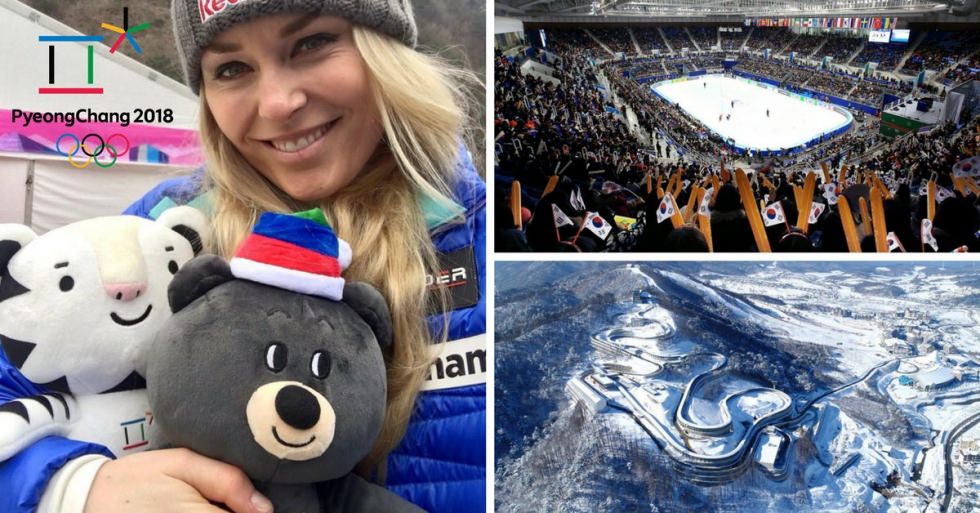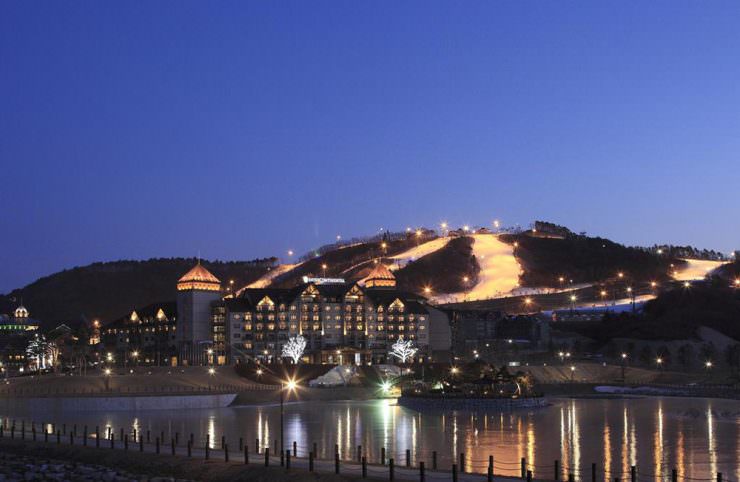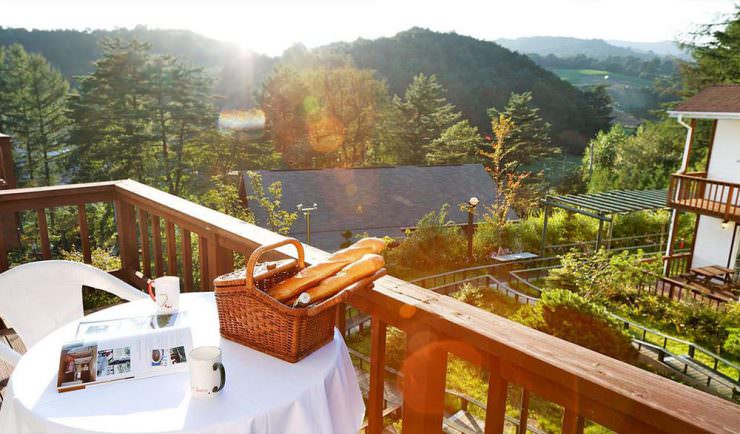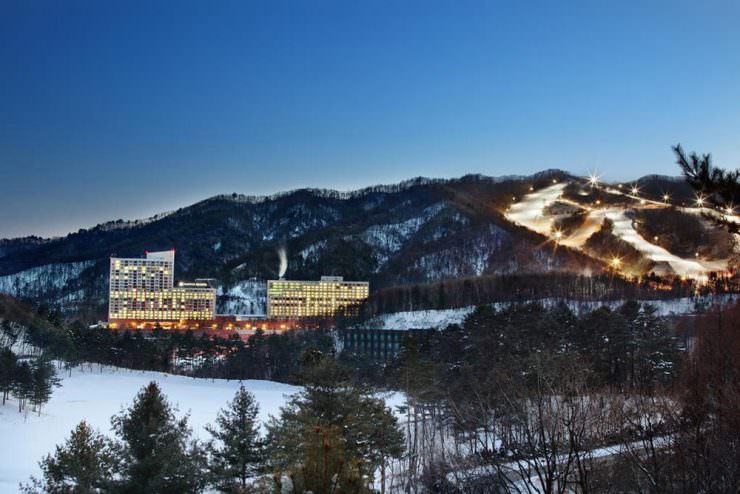I’ve been an avid follower of the Olympics since I was a kid, and in recent years, I’ve been lucky enough to volunteer at the Sochi Paralympics Games, the Rio Olympics and Paralympics, and the PyeongChang test events held in preparation for the 2018 Olympics. The 2018 Olympics will be held in PyeongChang, South Korea from February 9th to 25th; the Paralympics will be held from March 8th to 18th.
And I highly recommend getting yourself to the Olympics and/or Paralympics at least once in your lifetime: this is a chance to see some of the most incredible athletes in the world doing things that you could never even dream of doing. But even if you’re only marginally interested in the sports, there are a ton of cultural exhibitions, evening activities, and more that go on with the Games—plus there’s the opportunity to meet great new friends from around the world and sample a little bit of a bunch of different cultures beyond that of the host country.
That said, planning your trip to the Olympics is just like any other trip: you’ll want to do plenty of research before you set out. If you’re struggling to figure out where to even get started, we have you covered. Here are some of the most commonly asked questions about planning a trip to the Games and the answers to your questions.
1. Where can I find information about the events?
The official website for the Olympic Games is www.pyeongchang2018.com; for the Paralympics, you’ll want to head over to this subpage. These pages will tell you all sorts of information about the sports and venues, the mascots, news related to the Games, and tons more. It’s a great general resource both for getting excited about your trip as well as fine-tuning the details. They’ve also got plenty of general information about Korea in case you plan on doing any other travel during you time there. It’s your one-stop shop to the Games.
For specific information about the sports that you want to see, you can either click through the various pages on the official website or (my preferred method) skip down to Question 5, find out who your official authorized ticket reseller is, and go to their website directly to see calendars and everything else that you need.
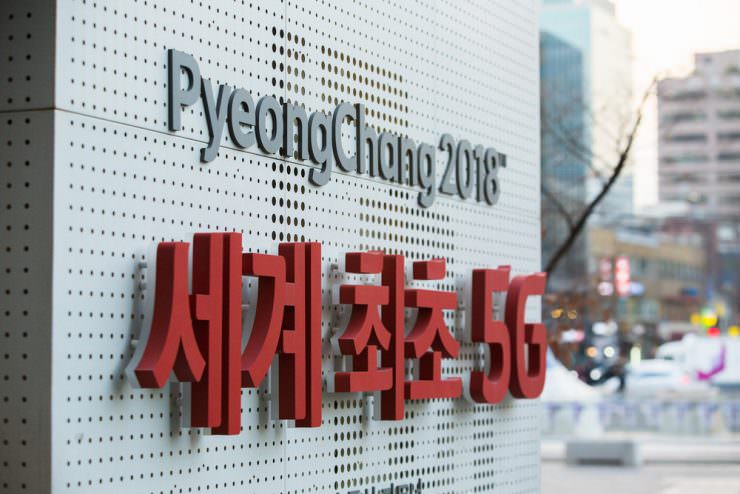
2018 Pyeongchang Winter Olympic Games © Shutterstock, Inc.
2. How many different venues will be used?
There will be a number of different venues that play host to the Olympics and Paralympics, as there are, of course, a number of different events. And they aren’t all right next to one another, either! The two main clusters are in PyeongChang and Gangneung. The PyeongChang Mountain Cluster contains:
- the Olympic Stadium (opening and closing ceremonies);
- Alpensia’s ski jumping, nordic skiing, biathlon, and sliding (bobsleigh, luge, and skeleton) centers;
- the two alpine ski centers of Yongpyong (giant slalom and slalom) and Jeongseon (downhill, super G, and alpine combined);
- and the Bokwang Snow Park (snowboard cross, halfpipe, slalom, and slopestyle, plus freestyle skiing).
The Gangneung Coastal Cluster, on the other hand, will contain:
- the Gangneung and Kwandong hockey centers;
- the Gangneung Oval (speed-skating);
- the ice arena (figure skating and short-track speed-skating);
- and the curling center.
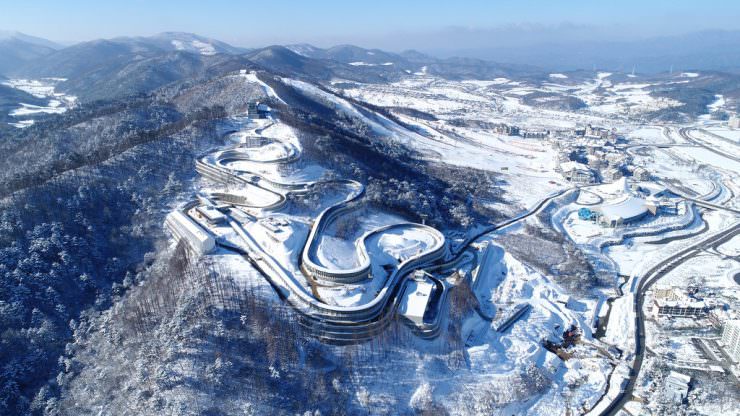
Alpensia Sliding Centre © PyeongChang 2018
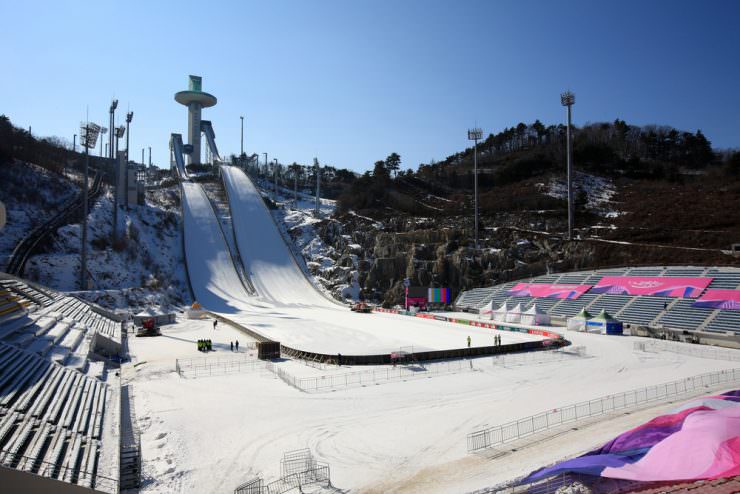
Alpensia Olympic Ski Jump Center in Pyeongchang © Shutterstock, Inc.
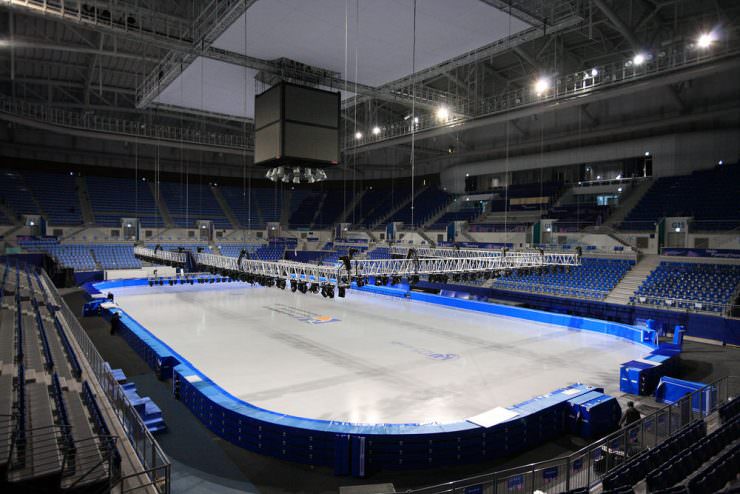
The Gangneung Ice Arena © Shutterstock, Inc.
3. How can I get around?
Getting from Seoul to PyeongChang and Gangneung should be easy with the high-speed rail that they’re putting in. As far as getting around from venue to venue, there’s already a pretty well-developed set of bus routes through the region that will take you between the major cities as well as intercity buses in Gangneung and PyeongChang, and you can expect that things will be expanded upon in time for the Games. Or if you’re looking to rent your own car, you should also have no problem: they’re currently busy at work repairing and widening highways to accommodate the expected influx of visitors.
One thing to note, though, is that travel time between different cities will still take some time—even with the high-speed rail going in, it’s expected to take about two hours to travel from Seoul to Gangneung, and of course things will be slower on the highways. Make sure you’re factoring that in when you’re making plans about which events to see and when or else you could be stuck in transit rather than actually enjoying your experience at the Games!
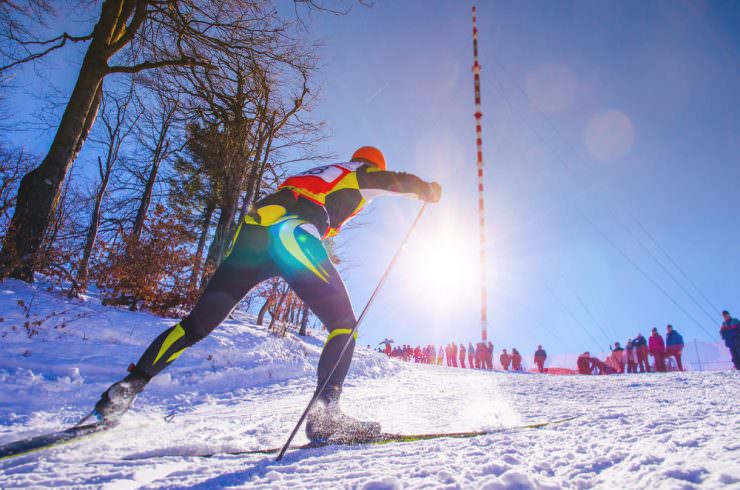
2018 Pyeongchang Winter Olympic Games © Shutterstock, Inc.
4. Where should I stay?
This is going to depend really on what you’re looking to do during the Games. Some people who are planning on just going to one or two events may find it easier to stay in Seoul and just commute out for a day trip to the various venues. Or if you’re looking at seeing, say, figure skating, hockey, and curling, you’ll want to base yourself in Gangneung rather than PyeongChang proper. I recommend checking out the accommodation guide on the PyeongChang 2018 website as a start, but be aware that there are plenty of other options as well, at a variety of price points.
Be aware that some venues, such as Jeongseon, have limited accommodation nearby and a commute may be necessary, especially if you’re not interested in spending a small fortune on accommodation right next to the venue. But don’t worry; the Olympics planning committee knows this will be the case, and they (or your hotel) will make sure there are ways to get you to where you need to go.
I recommend securing your spot as soon as you can since many of these places will sell out (or possibly increase their prices) as we get closer to the Games!
5. What do I need to know about booking tickets?
The first thing you should be aware of is that tickets are already on sale in many countries! If you don’t live in Korea, you’ll need to go through your country’s official ticket reseller—for many places in North America and Europe, this is CoSport. Create an account on their website and you’ll be able to browse through the different tickets that are available.
Don’t be alarmed if you can’t find tickets for the events that you’re interested in: they release tickets as they become available, so just because there aren’t any tickets for the Opening Ceremony, for example, at the moment, it doesn’t mean that they’ve totally sold out. It’s best to a) create an account so that you get alerted when new tickets go on sale and b) keep checking back.
Another important thing to note for anyone planning to visit the Games is that one of the major sponsors of the Olympics and Paralympics is VISA. This means that only VISA cards (or cash) are accepted for ticket purchases and for purchases made at shops and food stalls within the venues!

Lindsey Vonn with The Pyeongchang 2018 Mascots © PyeongChang 2018
6. Can’t I just book tickets when I get there?
Well, yes and no. If you’re attempting to attend some of the more popular events like the ceremonies, the ice hockey finals, figure skating, or other things like that, you may find that all the tickets have sold out by the time you get there. Counterfeit tickets can also be an issue at large events like these, so it’s recommended that you don’t purchase them second-hand from scalpers or anyone on the streets.
However, if you happen to suddenly find yourself with a free night, look into what events are going on—there’s a chance you may be able to find cheap, last-minute tickets to a sport that you might never have thought you’d be interested in!
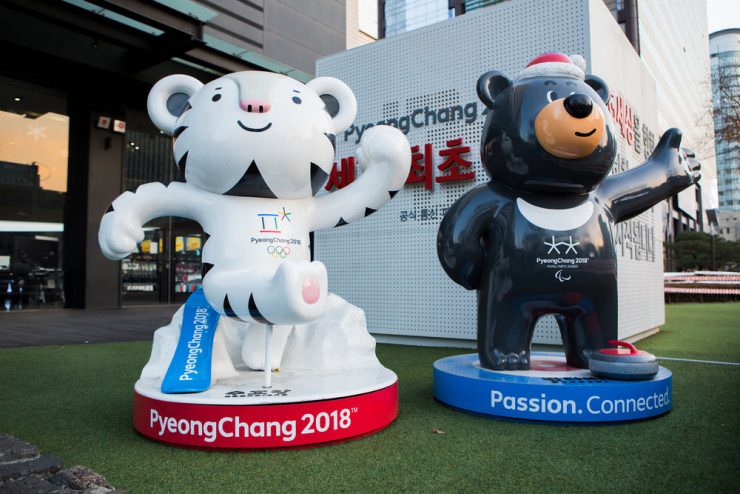
Mascots of the Winter Olympic Games 2018 in Pyeongchang © Shutterstock, Inc.
7. When should I book my flights?
The sooner, the better! Although you may be able to find last-minute deals on flights, the Games are a major event, and that means that instead of tickets being cheapest in that 4-6 week interval before the flight, they actually tend to just increase in price the closer we get to the events. So if you see what appears to be a good deal, jump on it! Many major airlines are already displaying flights during the time of the Olympics, so even if you don’t plan on booking yet, you might want to set up a fare alert just so you can budget and plan accordingly.
8. Do I need a visa?
Coming from the United States, Canada, and many other countries, and depending on how long you plan to stay, you won’t need a visa to visit South Korea. If you’re coming from Europe, on the other hand, its likely that you will need to acquire a visa prior to your trip—so make sure you check with the Korean Embassy in your home country prior to setting out on your trip! And make sure that your passport will be valid for the duration of your stay. If you need to renew it, it’s easier to get that out of the way now rather than waiting until the last minute.
9. Are Korea and the Olympics/Paralympics safe?
Absolutely. Of course, you’ll want to be smart about what you’re doing there, as you would in any other foreign country. If you see any sort of demonstration going on, you’ll want to avoid it, and you’ll want to make sure you’re being smart about your valuables such as you phone or your camera. But there will be plenty of security in place around the events, so although it’s possible that something might happen, with the world’s eyes all focused on PyeongChang, it’s just as likely that something could happen to you back home.
That said, it’s always a good idea to register with the State Department prior to your trip (if your country has such a program) so that you receive alerts about the current situation while you’re traveling.
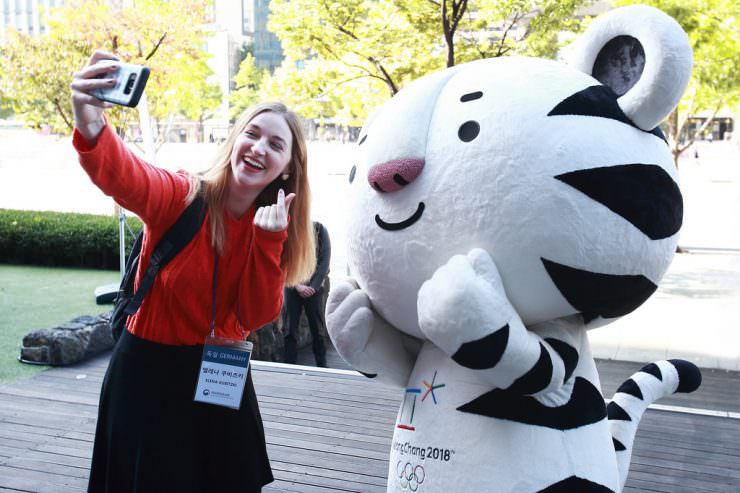
The Pyeongchang 2018 mascots © PyeongChang 2018
10. How can I volunteer?
Unfortunately, the volunteer process is already well under way, as we’re already within a year of the Olympics Opening Ceremony (although there is a waitlist, and you never know!). In fact, at this point, many of the Korean volunteers have already been selected, and international volunteers will be officially announced in the next couple months.
When it comes to an event as large-scale as the Olympics, the call for volunteers is usually put out about two years prior to the event, and then there are some steps that you go through online in the lead-up, such as a Skype interview and language proficiency exams. If you’re interested, though, think about applying for the Tokyo 2020 Games, or consider applying to sport-specific events such as world cup events or even local club events. Any related experiences that you can add to your CV prior to applying as an Olympics volunteer is a bonus!
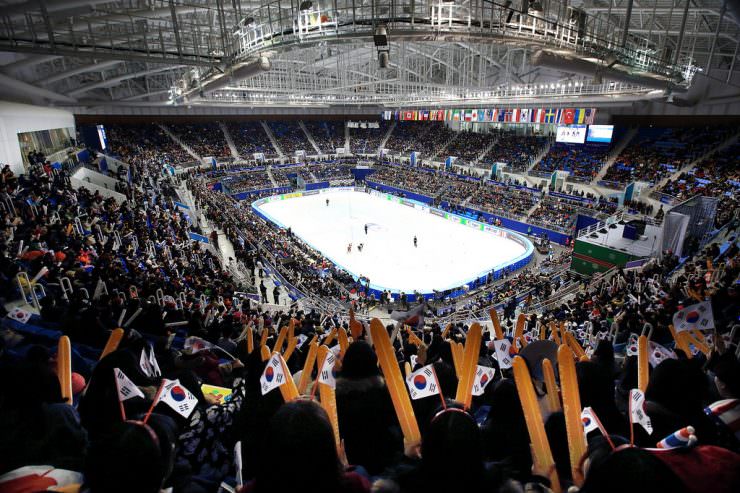
© PyeongChang 2018
11. What else should I see while I’m in Korea?
There’s tons to see and do all around Korea, and I highly recommend combining your trip to the Games with a trip to some of the beautiful palaces and other sights that Korea has to offer. Most international visitors will fly into Seoul, and there’s no reason not to spend at least a couple days there visiting Gyeongbokgung Palace, Insadong, and the other fascinating tourist sites there.
And even if you’re not planning on going to any of the sporting events in the city of Gangneung, it’s definitely worth a visit, even for just a day trip. You’ll get to view the Sea of Japan (and take a dip, if you’re really brave!) plus feast on some incredible seafood. The city is known for its great shopping, and even if you’re not in the market for anything, you won’t want to miss the interesting traditional markets, which sell everything from dried squid jerky to handmade clothing.
For a trip further afield, you may want to visit paradisiacal Jeju Island, which is located in the far south of the country. The island is known for its beautiful beaches, great food, and temperate climates—which can be especially pleasant after coming from the winter temperatures in PyeongChang!
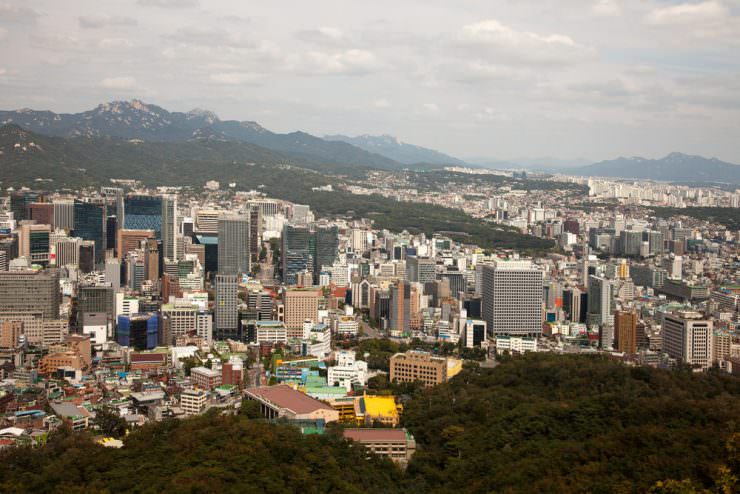
Aerial view of Seoul, South Korea © Shutterstock, Inc.
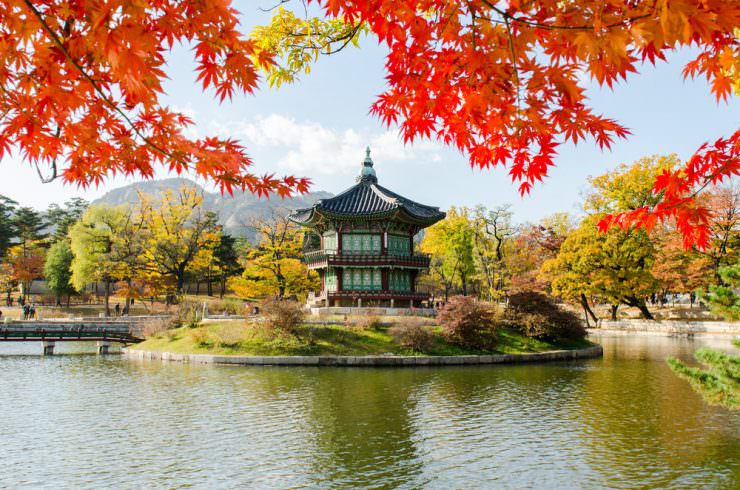
Gyeongbokgung Palace in Seoul, South Korea © Shutterstock, Inc.
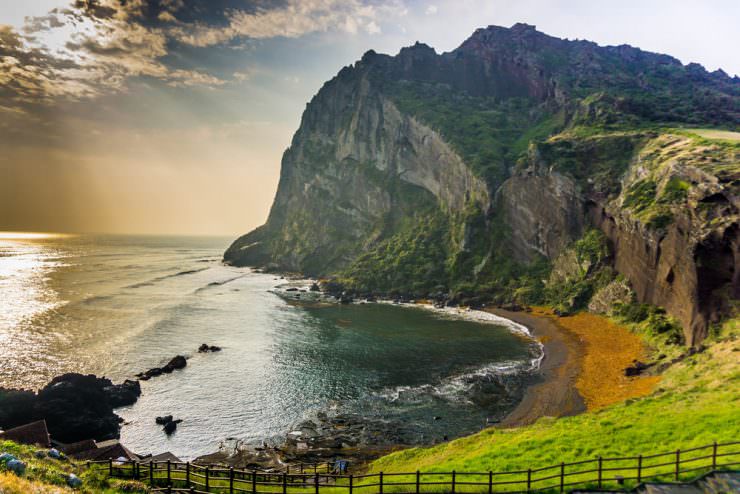
The Songaksan Mountain at Jeju Island in South Korea © Shutterstock, Inc.
Have another question that I haven’t answered? Feel free to ask away in the Comments section below and I’ll do my best to answer!
